May 21, 2025 | 08:09 GMT +7
May 21, 2025 | 08:09 GMT +7
Hotline: 0913.378.918
May 21, 2025 | 08:09 GMT +7
Hotline: 0913.378.918
After over 25 years of provincial re-establishment since 1997, Bac Kan province has overcome numerous difficulties and challenges, achieving significant milestones across all sectors.
However, the economic development of Bac Kan province currently fails to match its potential, as the province still lies within the "developmental gap" of the region and the country.
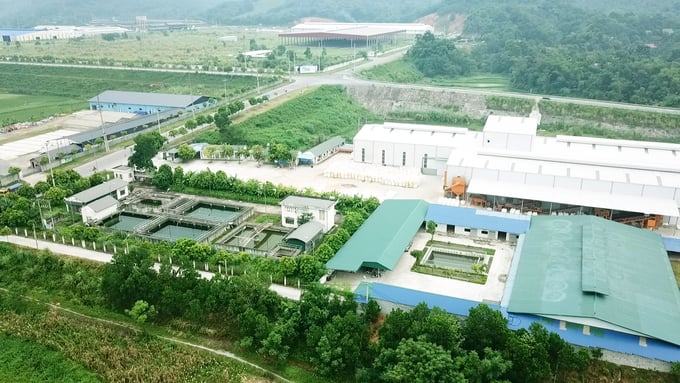
The Thanh Binh Industrial Zone in Cho Moi district is home to numerous enterprises actively engaged in the processing of wood and agricultural products. Photo: NT.
In response to this issue, Bac Kan province has focused on developing a plan for the years between 2021 and 2030, with a vision towards 2050; outlining a strategy to leverage the local potential and advantages through collaboration with provinces nationwide.
The Prime Minister issued a decision on November 3, 2023, approving the Bac Kan province's development plan from 2021 to 2030, with a vision towards 2050.
Accordingly, this plan holds strategic significance, serving as a driving force for economic and social development, as well as opening up new cooperation and investment opportunities for Bac Kan province with domestic and international partners.
Furthermore, the province aims to become a developed province within the region by 2030, with a harmonious and logical development gap between urban and rural areas, and between economically developed regions and ecologically preserved areas, thereby fostering cultural conservation.
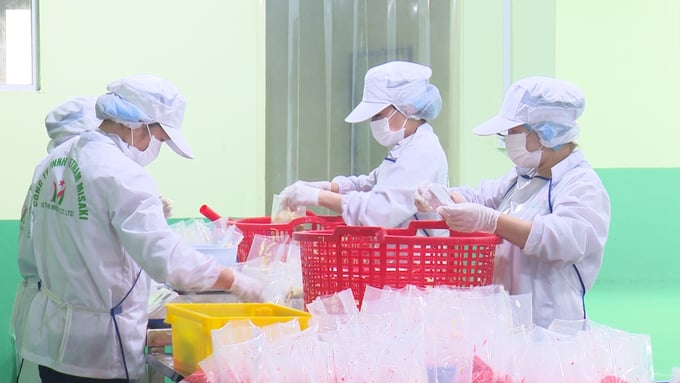
The agricultural processing industry in Bac Kan province is developing rapidly. Photo: Ngoc Tu.
This provincial plan has outlined five key tasks, six breakthrough developments, three economic corridors, and five socio-economic regions. Notably, the province will focus on the establishment of dynamic development axes, including the Hanoi – Thai Nguyen - Bac Kan – Cao Bang economic corridor and the Tuyen Quang - Bac Kan - Lang Son economic corridor.
These economic corridors will be important breakthrough factors in laying the foundation and providing direction for the rapid development of Bac Kan province in the near future.
One of the six identified breakthroughs in the provincial plan involves attracting investment in the agricultural and forestry sector, with an emphasis on commodity production and establishing high-tech agriculture models. The Prime Minister has considered this feature as one of the most significant breakthroughs in the approved provincial plan.
Bac Kan province's advantage lies in its agricultural land area, which exceeds 413 thousand hectares, accounting for 85% of the total natural land area. Additionally, the forestry land area accounts for over 372 thousand hectares, with approximately 272 thousand hectares of natural forests and over 100 thousand hectares of planted forests. The local average wood yield is estimated at over 305 thousand cubic meters.
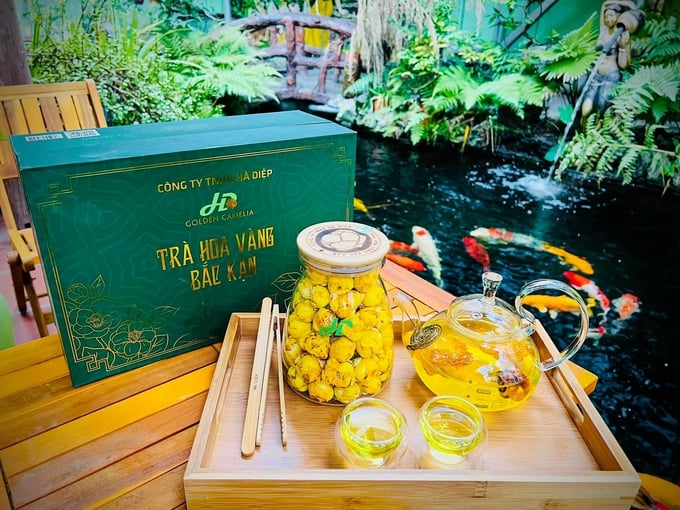
The production and processing of medicinal herbs is forecast to become an attractive industry in the future, drawing substantial investments into Bac Kan province. Photo: NT.
Regarding the agricultural sector, Bac Kan province is currently undergoing significant innovation in terms of production and business methods in accordance with the development of agricultural economics. This involves forming and developing value chains, promoting cooperation, intra-provincial and intra-regional linkages, as well as collaborations between regions, nationally, and internationally.
Bac Kan province is concentrating on developing advantageous key product groups, thereby establishing concentrated commodity production areas to meet market demand, and supply sufficient raw materials for processing industries.
Based on its potential and strengths, Bac Kan's provincial plan delineates the goal of "developing Bac Kan province towards a center for the production and processing of wood and medicinal herbs in the midland mountainous region of Northern Vietnam."
Accordingly, the province will promote modernization in the development of the forestry economy, with a focus on three key areas: developing the carbon credit market, expanding biomass electricity, and advancing the processing industries of agricultural, forestry, pharmaceutical, medicinal herbs, wood, and other products.
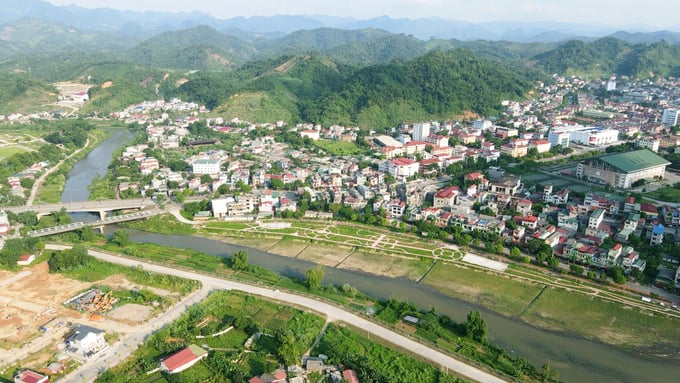
Bac Kan strives to become a developed province within the region by 2030. Photo: Ngoc Tu.
The forestry sector in Bac Kan province is currently being developed as a modern, economically efficient sector. Namely, the sector focuses on improving the quality and economic efficiency of forestry production, constructing forestry roads, and emphasizing the productio of commercially viable forestry species.
The province is formulating mechanisms and policies for the development of medicinal herb production under forest canopies and non-wood forest products. There is also a strong emphasis on developing environmental services related to forestry.
Bac Kan province is currently expanding the scale of the Thanh Binh Industrial Zone in Cho Moi district, completing the construction of the Huyen Tung Industrial Cluster in Bac Kan city, and continuing the development of industrial clusters in Ba Be, Cho Don, Na Ri, Ngan Son, etc. These industrial zones and clusters will prioritize attracting investments from businesses engaged in the processing of agricultural and forestry products, with the aim of producing high-quality products for both domestic consumption and export.
Translated by Nguyen Hai Long
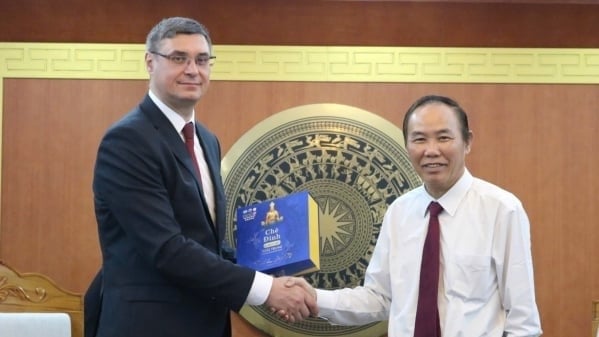
(VAN) The trade turnover of agro-forestry-fishery products is growing significantly, along with investment cooperation commitments that are opening up new development directions between Vietnam and Russia.

(VAN) Khanh Hoa is investing over 545 billion VND to develop 240 hectares of high-tech marine aquaculture in order to guarantee a consistent supply of seafood exports and achieve the USD 1 billion target.

(VAN) Minister of Agriculture and Environment Do Duc Duy held a meeting with Soopakij Chearavanont, Chairman of C.P. Group, on May 15.
/2025/05/16/3800-0-nongnghiep-143756.jpg)
(VAN) Suntory PepsiCo Vietnam coordinated with the Ministry of Education and Training to implement an education program on water conservation, reaching nearly 1 million primary school students nationwide.

(VAN) Vietnam’s TH Group officially put its high-tech fresh milk processing plant into operation in the Russian Federation, marking a historic moment as the first TH true MILK cartons were produced in Russia.

(VAN) Use of high-quality broodstock and biotechnology is regarded as the most effective approach to ensuring sustainable and economically viable shrimp aquaculture ahead of climate change and the emergence of increasingly intricate disease patterns.

(VAN) Carbon farming is a form of agricultural practices that helps absorb more greenhouse gases than it emits, through smart management of soil, crops, and livestock.